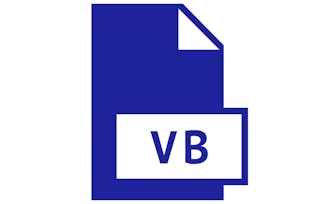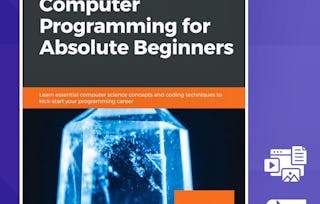This course offers a comprehensive introduction to programming using flowcharts and pseudocode, ideal for anyone new to programming. You'll gain a solid understanding of key programming concepts like variables, operators, conditional statements, loops, functions, and more. By the end of the course, you’ll be able to visualize logic and translate it into simple pseudocode that can be used in any programming language.

Fundamentals of Programming Using Flowchart and Pseudocode

Fundamentals of Programming Using Flowchart and Pseudocode

Instructor: Packt - Course Instructors
Included with
Recommended experience
What you'll learn
Master how to create flowcharts and pseudocode for programming logic.
Understand different variable types and how to use them in coding.
Learn how to implement conditional logic using if-else and switch statements.
Gain proficiency in using loops and functions for efficient coding.
Skills you'll gain
Details to know

Add to your LinkedIn profile
8 assignments
See how employees at top companies are mastering in-demand skills

There are 9 modules in this course
In this module, we will introduce you to the course layout and objectives, providing a roadmap of what you'll learn. You'll also gain an understanding of programming, software development, and how flowcharts and pseudocode are essential for solving programming problems.
What's included
2 videos1 reading
In this module, we will guide you through the installation of diagrams.net and Notepad++, tools essential for creating flowcharts and writing pseudocode. You'll learn the basics of flowchart creation, explore the role of pseudocode in programming, and practice writing pseudocode through hands-on assignments.
What's included
6 videos1 assignment
In this module, we will introduce you to the concept of variables, including the different types such as integers, floats, booleans, characters, and strings. You'll explore how to declare and use these variables correctly through examples and assignments. Additionally, we will discuss the importance of keywords in programming and how to avoid common pitfalls.
What's included
12 videos1 assignment
In this module, we will explore the fundamentals of operators, detailing their importance in programming. You'll learn about the different types of operators, such as arithmetic, relational, and logical, and see how they are applied through examples.
What's included
1 video1 assignment
In this module, we will cover the essential concept of conditional statements, which determine the flow of a program. You’ll explore different types of conditionals, including If, If-Else, Nested If-Else, and Switch statements, with practical examples and assignments. We’ll also provide tips to enhance your use of conditional logic for efficient coding.
What's included
10 videos1 assignment
In this module, we will introduce you to loops, one of the most powerful constructs in programming. You’ll learn about the different types of loops available and how to use them effectively. We’ll also share key tips for optimizing your use of loops to write more efficient and reliable code.
What's included
3 videos1 assignment
In this module, we will explore the concept of functions, a fundamental programming construct. You'll learn what a function signature is and how it defines a function’s structure. Additionally, we will cover the two main types of functions in programming, helping you understand their roles and applications.
What's included
3 videos1 assignment
In this module, we will cover the role of comments in programming, explaining why they are essential for writing clear and understandable code. You’ll learn about the different types of comments and see examples of how to use them in your code for better organization and documentation.
What's included
2 videos1 assignment
In this module, we will introduce you to exceptions, a critical aspect of error handling in programming. You'll learn about the different types of exceptions and their significance, as well as how they help you manage errors effectively in your code.
What's included
1 video1 assignment
Instructor

Offered by
Explore more from Algorithms
 Status: Free Trial
Status: Free TrialDuke University
 Status: Free Trial
Status: Free TrialLearnQuest
 Status: Free Trial
Status: Free TrialDuke University
Why people choose Coursera for their career

Felipe M.

Jennifer J.

Larry W.

Chaitanya A.

Open new doors with Coursera Plus
Unlimited access to 10,000+ world-class courses, hands-on projects, and job-ready certificate programs - all included in your subscription
Advance your career with an online degree
Earn a degree from world-class universities - 100% online
Join over 3,400 global companies that choose Coursera for Business
Upskill your employees to excel in the digital economy
Frequently asked questions
Yes, you can preview the first video and view the syllabus before you enroll. You must purchase the course to access content not included in the preview.
If you decide to enroll in the course before the session start date, you will have access to all of the lecture videos and readings for the course. You’ll be able to submit assignments once the session starts.
Once you enroll and your session begins, you will have access to all videos and other resources, including reading items and the course discussion forum. You’ll be able to view and submit practice assessments, and complete required graded assignments to earn a grade and a Course Certificate.
More questions
Financial aid available,


